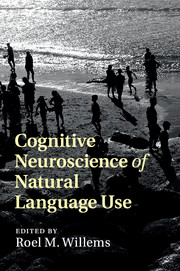Crossref Citations
This Book has been
cited by the following publications. This list is generated based on data provided by Crossref.
Lüdtke, Jana
and
Jacobs, Arthur M.
2015.
The emotion potential of simple sentences: additive or interactive effects of nouns and adjectives?.
Frontiers in Psychology,
Vol. 6,
Issue. ,
Jacobs, Arthur M.
2015.
Neurocognitive poetics: methods and models for investigating the neuronal and cognitive-affective bases of literature reception.
Frontiers in Human Neuroscience,
Vol. 9,
Issue. ,
Desai, Rutvik H.
Choi, Wonil
Lai, Vicky T.
and
Henderson, John M.
2016.
Toward Semantics in the Wild: Activation to Manipulable Nouns in Naturalistic Reading.
The Journal of Neuroscience,
Vol. 36,
Issue. 14,
p.
4050.
Brennan, Jonathan
2016.
Naturalistic Sentence Comprehension in the Brain.
Language and Linguistics Compass,
Vol. 10,
Issue. 7,
p.
299.
Willems, Roel M.
Frank, Stefan L.
Nijhof, Annabel D.
Hagoort, Peter
and
van den Bosch, Antal
2016.
Prediction During Natural Language Comprehension.
Cerebral Cortex,
Vol. 26,
Issue. 6,
p.
2506.
Nicklas, Pascal
and
Jacobs, Arthur M.
2017.
Rhetoric, Neurocognitive Poetics, and the Aesthetics of Adaptation.
Poetics Today,
Vol. 38,
Issue. 2,
p.
393.
Wolf, Dhana
Rekittke, Linn-Marlen
Mittelberg, Irene
Klasen, Martin
and
Mathiak, Klaus
2017.
Perceived Conventionality in Co-speech Gestures Involves the Fronto-Temporal Language Network.
Frontiers in Human Neuroscience,
Vol. 11,
Issue. ,
Menninghaus, Winfried
Wagner, Valentin
Hanich, Julian
Wassiliwizky, Eugen
Jacobsen, Thomas
and
Koelsch, Stefan
2017.
The Distancing-Embracing model of the enjoyment of negative emotions in art reception.
Behavioral and Brain Sciences,
Vol. 40,
Issue. ,
Frank, Stefan L.
and
Willems, Roel M.
2017.
Word predictability and semantic similarity show distinct patterns of brain activity during language comprehension.
Language, Cognition and Neuroscience,
Vol. 32,
Issue. 9,
p.
1192.
Bögels, Sara
and
Levinson, Stephen C.
2017.
The Brain Behind the Response: Insights Into Turn-taking in Conversation From Neuroimaging.
Research on Language and Social Interaction,
Vol. 50,
Issue. 1,
p.
71.
Jacobs, Arthur M.
Schuster, Sarah
Xue, Shuwei
and
Lüdtke, Jana
2017.
What’s in the brain that ink may character …..
Scientific Study of Literature,
Vol. 7,
Issue. 1,
p.
4.
Jacobs, Arthur M.
and
Willems, Roel M.
2018.
The Fictive Brain: Neurocognitive Correlates of Engagement in Literature.
Review of General Psychology,
Vol. 22,
Issue. 2,
p.
147.
Brennan, Susan E.
Kuhlen, Anna K.
and
Charoy, Jeanne
2018.
Stevens' Handbook of Experimental Psychology and Cognitive Neuroscience.
p.
1.
Wolf, Dhana
Mittelberg, Irene
Rekittke, Linn-Marlen
Bhavsar, Saurabh
Zvyagintsev, Mikhail
Haeck, Annina
Cong, Fengyu
Klasen, Martin
and
Mathiak, Klaus
2018.
Interpretation of Social Interactions: Functional Imaging of Cognitive-Semiotic Categories During Naturalistic Viewing.
Frontiers in Human Neuroscience,
Vol. 12,
Issue. ,
Vetchinnikova, Svetlana
2019.
Phraseology and the Advanced Language Learner.
Catrysse, Leen
Gijbels, David
and
Donche, Vincent
2019.
A Systematic Review on the Conceptualization and Operationalization of Students' Levels of Processing in Functional Magnetic Resonance Imaging Studies.
Mind, Brain, and Education,
Vol. 13,
Issue. 3,
p.
198.
Alday, Phillip M.
2019.
M/EEG analysis of naturalistic stories: a review from speech to language processing.
Language, Cognition and Neuroscience,
Vol. 34,
Issue. 4,
p.
457.
Peeters, David
2019.
Virtual reality: A game-changing method for the language sciences.
Psychonomic Bulletin & Review,
Vol. 26,
Issue. 3,
p.
894.
Gao, Xin
Dera, Jeroen
Nijhof, Annabel D.
Willems, Roel M.
and
Protopapas, Athanassios
2019.
Is less readable liked better? The case of font readability in poetry appreciation.
PLOS ONE,
Vol. 14,
Issue. 12,
p.
e0225757.
Shaules, Joseph
2019.
Language, Culture, and the Embodied Mind.
p.
43.





